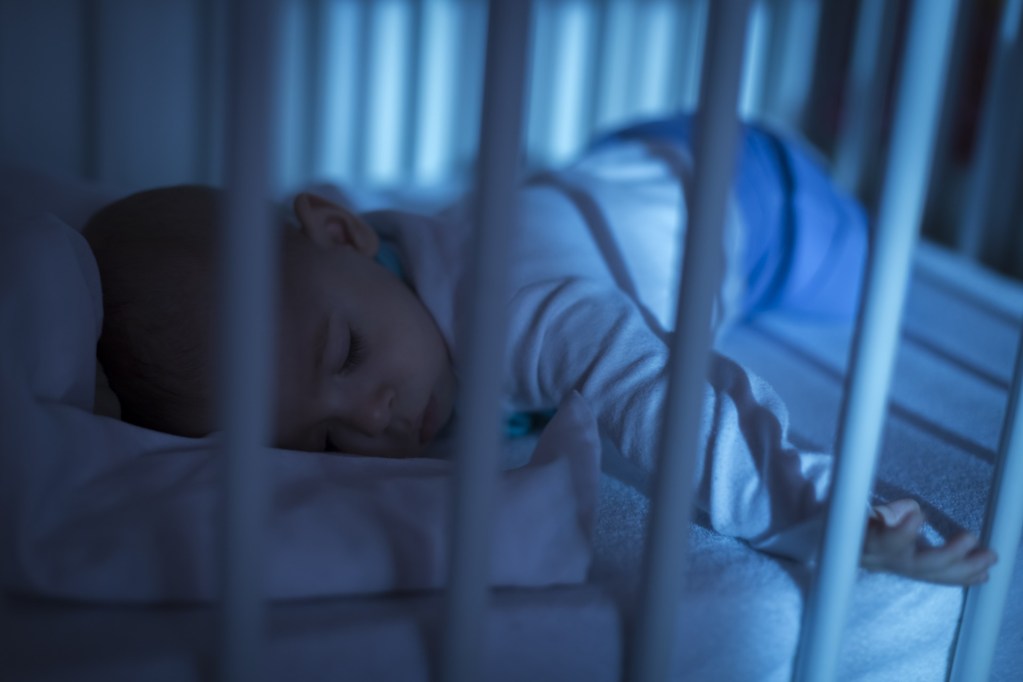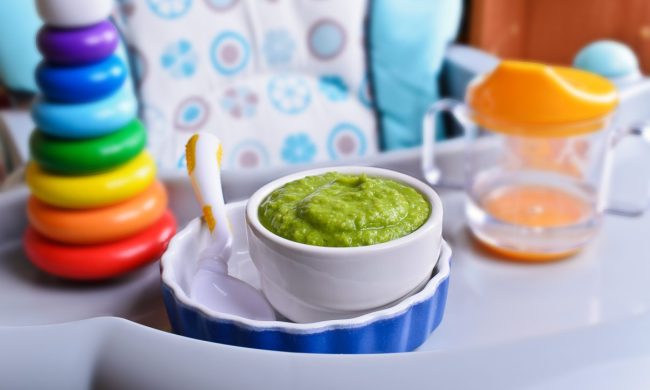Babies historically do not sleep through the night. Parents are typically up and down during those midnight hours tending to baby. Sometimes it’s for a wet diaper or maybe it’s that 2 a.m. feeding. So, it’s easy to see why having a night light in baby’s room is a great idea. How else are sleep-deprived parents supposed to see what they’re doing Biologically speaking though the best lighting to use in your baby’s nursery is none at all.
A dark room helps set your infant’s circadian rhythm for sleeping more at night and less during the day. Babies aren’t born afraid of the dark which means night lights are more for the convenience of parents. If you are more comfortable using a night light, a dim red light is by far the best option. The red light stimulates the production of melatonin, a sleep hormone. So, should babies sleep with a night light at all?
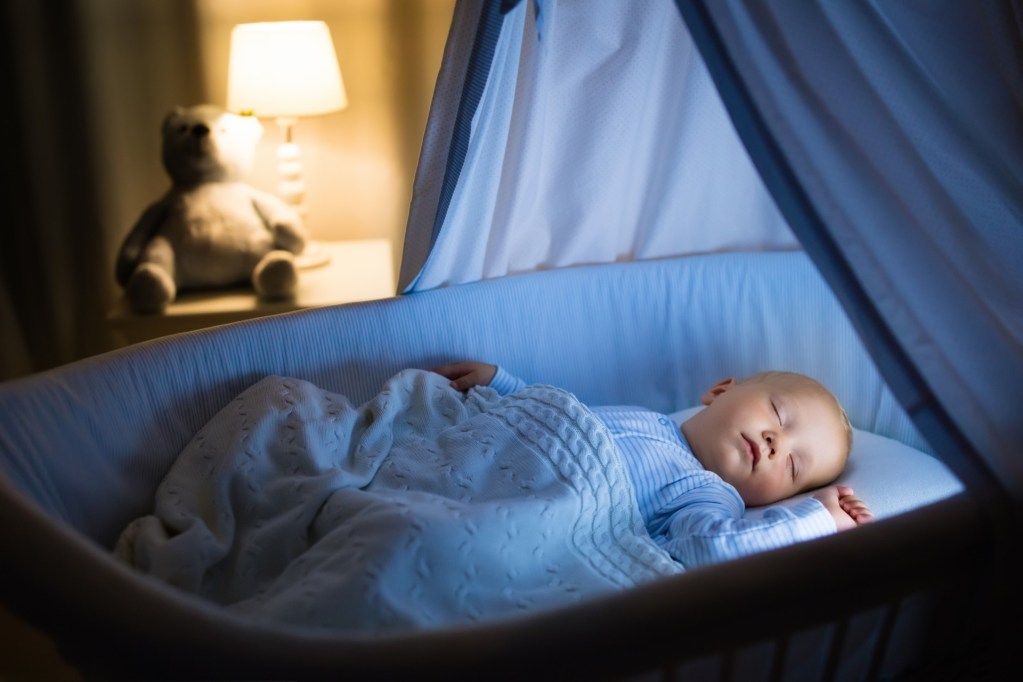
Are night lights for babies a good idea?
Plugging in a cute teddy bear night light to go with the theme of your baby’s nursery seems like a good idea. Parents are often in and out of the nursery during the night. A stubbed toe on the corner of the crib feels even worse in the wee hours of the morning. Is a night light more for the parents or the baby?
Turns out a night light isn’t actually necessary for baby to sleep. Using one may actually keep babies from falling asleep or from setting their circadian rhythm. According to the Sleep Foundation, light interferes with the body’s natural production of melatonin. Melatonin is a hormone that helps us fall asleep. This includes your baby’s sleep hygiene. So, when it’s time to start winding down to put baby to bed, the harsh lights in the hallway or bathroom may just be the reason why your little one struggles to fall asleep at night.
If you don’t have a night light though, then how do you change baby’s diaper or give that overnight bottle? Turning the bedroom or hall light on is bound to disrupt baby’s sleep for the rest of the night which means sleep-deprived parents are back looking at night lights. Don’t worry. There are nighttime lighting options that won’t wreak havoc with your baby’s sleep patterns. Let’s find out which baby-friendly night lights are the best picks so the entire house can get some sleep.
Don’t overlook the harsh lighting your child is exposed to before bedtime. For example, most bathrooms are lit by harsh and bright white light. This light exposure, right before bed, can cause sleeping difficulties for your baby long after they have left the room.
Using a battery-operated, red hue waterproof lamp or battery-operated candles can make a huge difference in your child’s sleep. In fact, we have mentioned some sleep-friendly examples here and some types to avoid. Find out if babies should sleep with a night light.

White-based or blue-based light? Which (if either) is best?
Many parents are making a big mistake that is inhibiting their baby’s sleep at night and they don’t even realize it. Most babies are put to bed using a night light or a light show of some description. These cute lights aren’t always soothing and can keep the little darlings awake long into the night. Night lights and light shows left on all night impact sleep time by tricking the body into thinking it’s still daylight.
The wavelength of different colors of light on the human body has a tendency to inhibit our sleep. White and blue-based lights, even if dim, inhibit the secretion of melatonin in the body at night. Melatonin works in line with the sensitivity of our eyes, thereby having a huge impact on the amount of sleep a person gets — especially babies.
When there isn’t any light, our eyes send a message to our brains to secrete melatonin, which causes feelings of drowsiness. In a world unpolluted by electric lights, the secretion of melatonin in children would likely occur at dusk. Melatonin is necessary for a baby to not only go to sleep but stay asleep for longer during the night.
Most children’s night lights utilize white, blue, or green hues. These colors are commonly considered to be soothing, so manufacturers select them for their products. White- and blue-based lights, which cover almost all forms of lighting used in the home, actually block the body’s production of melatonin. It isn’t just lighting in your baby’s bedroom that makes a difference, though. The light emitted from screens, including televisions, laptops, tablets, and smartphones, can also cause problems and turn your child’s sleep hygiene upside down.
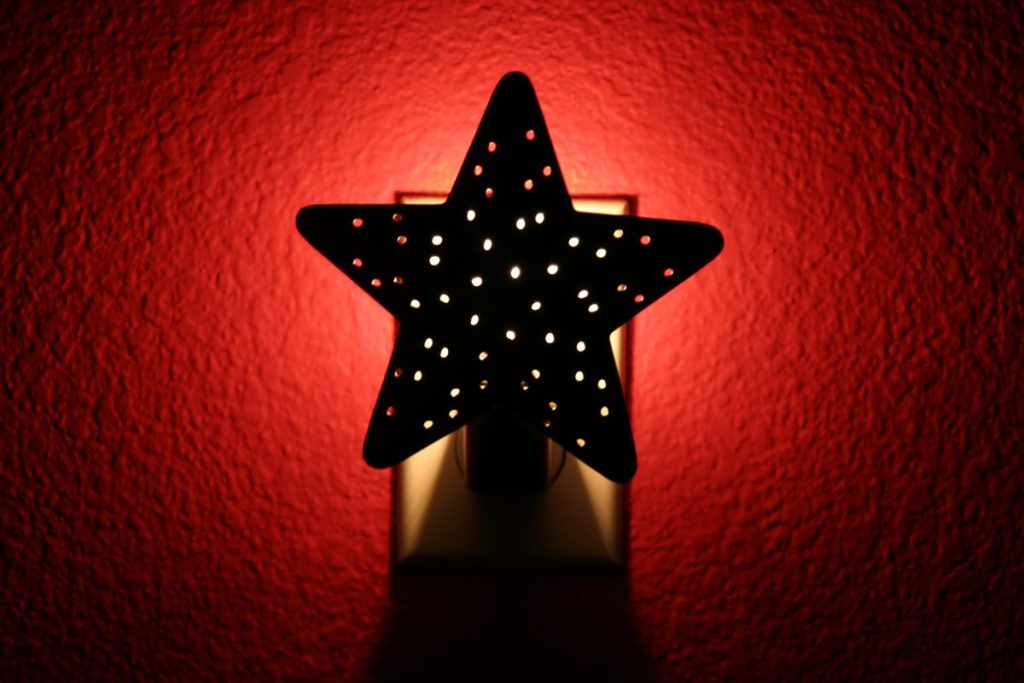
Soothing red light: The answer to the night light mystery
This doesn’t mean all night lights are bad. There is one type of light that doesn’t inhibit sleep: red. Red light has a higher wavelength than the commonly used white or blue light, which research shows does not inhibit melatonin. It doesn’t necessarily improve sleep. Red light just doesn’t interfere with the chemical building blocks of it. So, if your nursery is in need of some lighting, look for a night light that emits red lighting. For toddlers and kiddos afraid of the dark, plug in a red night light. You can find them on Block Blue Light and Amazon.
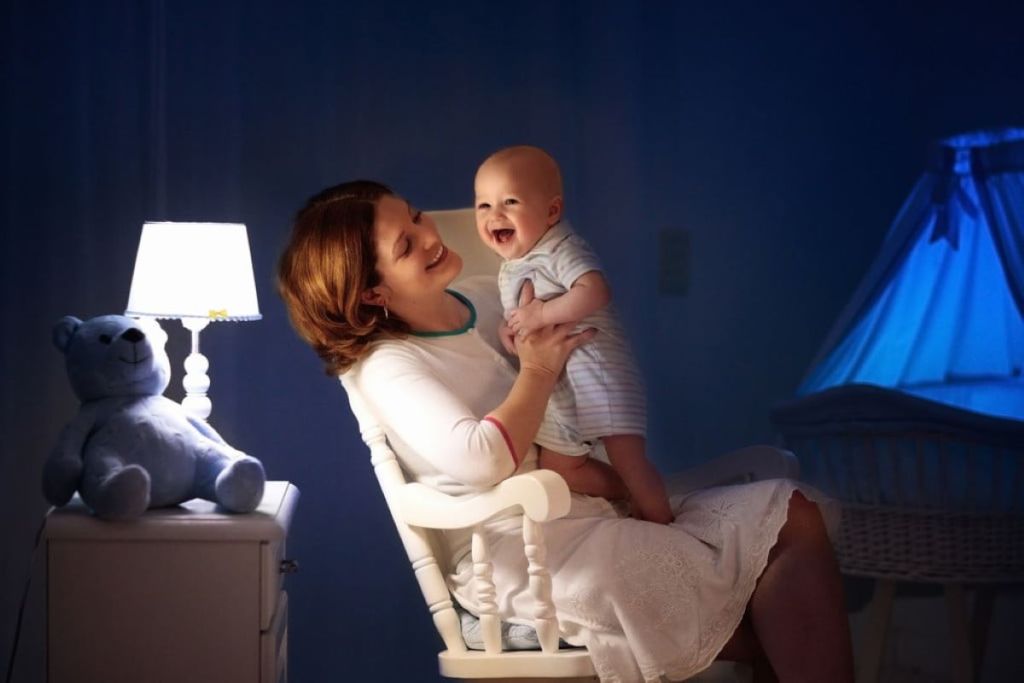
Top tips for sleep-friendly lighting that won’t keep baby awake
Developing healthy sleep hygiene for your baby is important. Sleep hygiene is a trendy term for the habits we have to help us fall asleep at night. Developing this healthy sleep hygiene for your little ones is the gift that keeps on giving. It’s also a gift you should give yourself. Here are some things to keep in mind for you and baby when it comes to that all-important nighttime routine.
- No screen time for two hours before bedtime.
- Naps should always happen in daylight. Ditch the blackout blinds for naps — they confuse the body’s biological clock and can cause trouble with nighttime sleep.
- Light bathrooms with waterproof, battery-operated red or orange hue lights.
- Dim lighting in living areas in the evening and close curtains and blinds at 6 p.m.
- Use a red-light bulb in a lamp in your child’s bedroom at night for their bedtime routine or to leave on overnight.
- Tape over lights on baby monitors that are white, green, or blue.

Good night, night light
There are justifiable reasons for using a night light in the nursery as well as good reasons to avoid it. If you want to use a night light in your baby or toddler’s room, just make sure it’s one that doesn’t inhibit your baby’s sleep, so you don’t wind up staying awake all night. Before making your night light final decision, test the waters with sleep-friendly lights and see how your baby does. Remember to see how baby sleeps without any night light at all. There isn’t a one-size-fits-all solution when it comes to deciding if babies should sleep with a night light.
